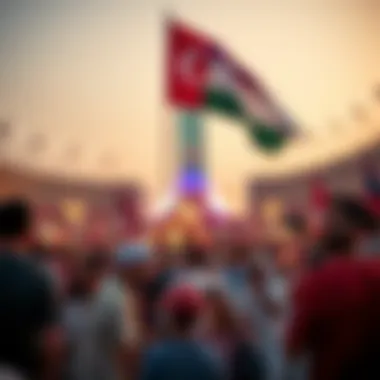Public Holidays in the UAE for 2023: A Comprehensive Guide


Intro
As the United Arab Emirates (UAE) continues to thrive as a bustling hub for business and tourism, understanding its public holidays offers more than just a calendar of days off. It delves into the cultural fabric of the nation, providing insights vital for investors, homebuyers, and expatriates.
In 2023, the UAE's public holidays highlight the importance of cultural appreciation and their implications for various sectors, particularly in the context of Dubai's real estate market. Recognizing these dates enables stakeholders to navigate planning and operational strategies effectively while also allowing for deeper engagement with Emirati traditions.
This article aims to dissect public holidays in the UAE for 2023, focusing on the significance of each day and how they intertwine with business operations and cultural practices. Furthermore, a detailed analysis will assist those looking to make informed decisions in real estate, investment, and travel. This is not merely about time off; it's about recognizing the rhythm of life in the UAE, the importance of family and community, and how these values impact business and travel within this dynamic environment.
By the end of this exploration, readers will be equipped with a wealth of knowledge, allowing for enhanced appreciation of Emirati culture and aiding in practical planning for their ventures or travels in the region. As we embark on this journey, let’s break down the public holidays in the UAE, understanding their historical contexts and contemporary relevance.
Market Insights
Understanding the nuances of public holidays in the UAE is critical not only for cultural reasons but also for financial and operational planning. Dubai, a city synonymous with rapid development and investment opportunities, witnesses several current trends in real estate that must align with these public holidays.
Current Trends in Dubai Real Estate
The real estate market in Dubai has been on a roller coaster ride of activity, driven by fluctuating demand, changing regulations, and the influx of expatriates. In recent months, there has been a notable surge in demand for residential properties, particularly in areas that offer a combination of luxury and practicality, such as Downtown Dubai and Dubai Marina.
- Increased Demand for Affordable Housing: The growing expatriate population is leading to a higher demand for affordable housing solutions.
- Shift Towards Sustainable Developments: Many investors are now looking at eco-friendly properties, as sustainability becomes a key concern.
- Growth of Holiday Homes: The rise of short-term rental options is changing the landscape of the rental market, catering to tourists and business visitors alike.
Predicted Market Growth and Future Opportunities
With the concurrent blooming of vacation and expatriate markets, several sectors are set to benefit significantly from the public holidays in the UAE:
- Real Estate Investment: Public holidays often lead to increased awareness of property ownership, attracting investors eager to capitalize on rental yields.
- Tourism Industry: As holidays bring in local and foreign travelers, hotels and businesses find their profits rising during these festive times.
- Cultural Events and Celebrations: Understanding when these cultural events occur can reveal opportunities for niche markets, catering to those who participate or observe.
In light of all this, keeping a pulse on public holidays is paramount for those engaged in the Dubai real estate market and beyond. It’s much more than stockpiling days off; it is about harnessing potential opportunities that these holidays unveil.
Overview of UAE Public Holidays
Public holidays in the UAE serve as vital markers of culture and tradition, bolstering a sense of national unity and identity. In this section, we will delve into the essence of these holidays, exploring their components and implications not only for residents but also for expatriates and businesses operating within the emirates.
Understanding the Significance of Public Holidays
Public holidays are so much more than days off work; they're a reflection of the region's rich history and culture. For Emiratis, holidays like Eid al-Fitr and UAE National Day are periods steeped in collective memory and pride. These celebrations invite people from all walks of life to gather, reaffirming their connections to family, friends, and the larger community. The emotional resonance attached to these dates goes beyond mere festivity. It's about honoring traditions, sharing values, and recognizing shared experiences. For businesses, especially in sectors like real estate and retail, grasping the significance of these holidays can guide marketing strategies and influence customer engagement. Considering how public holidays shape public sentiment and consumer behavior is essential for any savvy investor or market analyst.
Legal Framework Governing Holidays in the UAE
The legal structure surrounding public holidays in the UAE is quite structured and is governed by various laws that dictate how these days are observed. The federal government plays a crucial role in designating holidays, which are generally reflective of the Islamic calendar and significant national events.
For instance, Eid holidays are determined based on moon sightings, which can lead to variability each year. According to UAE labor laws, employees are entitled to days off during these recognized holidays, fostering a work-life balance that is central to Emirati values.
Understanding these regulations is key for expatriates and investors, as it shapes not only workforce management but also influences real estate agreements and rental contracts where time off can affect market performance.


In summary, public holidays in the UAE stand as a testament to its vibrant culture and adherence to Islamic practices. The recognition of these dates invites deeper connections within the country while providing substantial insights for businesses looking to navigate the unique market dynamics here.
List of Public Holidays in
The public holidays in the UAE for the year 2023 are not just days off from work; they hold cultural significance and offer opportunities for both residents and expatriates to connect with Emirati traditions. By understanding these holidays, investors, homebuyers, and expatriates can better navigate the social and economic landscape of the region. Knowledge of these dates can aid in planning travel and cultural participation, ensuring a smooth experience in the vibrant environment of the UAE.
New Year's Day
New Year's Day, celebrated on January 1, marks the beginning of the Gregorian calendar year. For many people across the globe, it symbolizes fresh starts and new resolutions. In the UAE, it is a public holiday, allowing families and friends to gather, embark on trips, or enjoy festive activities. The fireworks display in Dubai is particularly noteworthy; it often draws crowds and offers a chance to experience the city's modernity and spirit.
Eid al-Fitr
Eid al-Fitr, meaning "Festival of Breaking the Fast," is one of the most anticipated holidays in the Islamic calendar. It follows a month of fasting during Ramadhan. This day brings with it a sense of joy and reflection, marking the end of the fasting period.
Eid Dates and Observations
Eid al-Fitr takes place on the first day of Shawwal, the month that follows Ramadhan. The exact date varies annually based on the lunar calendar and the sighting of the new moon. Typically, Eid may fall on some time between the end of April and mid-May in 2023. To determine the exact day, local authorities announce the sighting announcement. The Eid al-Fitr holiday is a time for family reunions, sharing meals, and performing charitable acts, known as Zakat al-Fitr, which emphasizes community support.
Cultural Practices During Eid
Cultural practices during Eid al-Fitr enrich the experience for many. It is typical for families to wear new clothes, starting the day by performing a special Eid prayers at mosques or open prayer grounds. Following prayers, the day is often filled with visits to relatives and neighbors, accompanied by the sharing of sweet treats such as maamoul and kunafa. This practice fosters strong community bonds and reflects the importance of hospitality in Emirati culture.
Arafat Day
Arafat Day is marked on the second day of the Hajj pilgrimage and falls just before Eid al-Adha. This day holds immense significance for Muslims as it is believed to be the day when pilgrims gather on Mount Arafat for prayer and reflection. In the UAE, it is a public holiday that provides a moment for spiritual reflection as well as a chance for community engagement through charitable deeds and social gatherings.
Eid al-Adha
Eid al-Adha, also known as the "Festival of Sacrifice," honors the willingness of Ibrahim to sacrifice his son as an act of obedience to God. This holiday also has significant implications for the economy, as it encourages spending in various sectors from food to clothing.
Understanding Eid al-Adha Significance
The timing of Eid al-Adha is set according to the Islamic lunar calendar, specifically during the second half of Dhu al-Hijjah after the Hajj pilgrimage. It is celebrated within a context that emphasizes sacrifice and generosity. Families often share meat from the sacrificed animals, traditionally sheep, goats, or cows, with less fortunate individuals, which fosters a sense of community and solidarity among residents. Its significance not only enriches the spiritual life of the people but also emphasizes the values of love, compassion, and community.
Celebratory Traditions
Eid al-Adha is adored for its rich traditions, which include family feasts and gatherings. These gatherings are where you’ll see tables adorned with a variety of dishes from biryani to sweet pastries. Additionally, it is common to see festive decorations in public places, and communities engage in organizing events that bring people together. This creates a lively atmosphere that attracts both expatriates and locals alike, showcasing the communal spirit in the UAE.
Islamic New Year
The Islamic New Year, known as Hijri New Year, marks the beginning of the new lunar calendar. Even though it's not widely celebrated with the same enthusiasm as other holidays, it still provides an opportunity for reflection and planning for the year ahead. While businesses may not shut down, it's a time for personal contemplation and renewal of spirits. Those who observe this day often do so with family gatherings or quiet reflection.
Prophet Muhammad's Birthday


The observance of Prophet Muhammad's Birthday, or Mawlid al-Nabi, involves celebrations that honor the life and teachings of the Prophet. Although it varies among regions, in the UAE, the day is marked by prayers, educational events, and charitable acts that frame the life of the Prophet as a guide for contemporary living. This day focuses on enhancing spiritual growth within the community and supporting those in need.
UAE National Day
UAE National Day celebrates the unification of the emirates on December 2, 1971. It is a day of great national pride and vibrant celebrations held across the country.
Historical Context
The historical significance of UAE National Day is profound. It marks not only the formation of the UAE but also the strides made since then in terms of development, governance, and international relations. The day recalls the leadership of founding fathers and their collective vision for a prosperous future. Understanding this history is vital for homebuyers and investors, as it paints a picture of a dynamic and evolving society.
Celebrations Across the UAE
Across the UAE, celebrations range from grand parades and fireworks to cultural performances and private gatherings. Landmark structures are often illuminated, and the atmosphere is filled with festive music and dance. Major cities like Dubai and Abu Dhabi host events attracting both residents and tourists alike. Such celebrations reflect the unity of the nation while serving as an excellent opportunity for businesses to engage, fostering economic growth amidst the festivities.
"Public holidays in the UAE are not just days off; they intertwine with the cultural fabric and economic dynamics of the region."
In summary, the public holidays in the UAE in 2023 offer not just traditional observances but also insights into the cultural identity of the Emirates. They allow for thoughtful planning for both individuals and businesses, promoting community involvement and understanding of the rich Emirati heritage.
Public Holidays Impacting the Real Estate Sector
Public holidays in the UAE play a vital role in the real estate sector, influencing everything from transactions to market activity. Investors, homebuyers, and real estate agents need to grasp how these holidays shape the industry. The nature of the holidays often leads to fluctuations in property transactions, making them significant events for anyone involved in real estate.
Effects on Real Estate Transactions
Public holidays can remarkably influence real estate transactions. During these periods, potential buyers may intensify their property searches, expecting time off work to visit properties. Convenience becomes a major factor, as families often utilize these breaks to explore their future homes. However, the days off can also create delays; many real estate professionals take leave, potentially slowing down transactions.
The impact can vary significantly across different holidays. For instance, as Eid al-Fitr draws near, many individuals tend to focus on family visits and celebrations, diverting attention from real estate dealings. The busiest weeks typically precede the holidays when clients are eager to finalize purchases before the festivities.
“Understanding the pulse of the market during holidays is crucial for real estate professionals. It’s about aligning your strategy with buyers' behaviours.”
Market Activity During Holidays
Real estate market activity often fluctuates during holidays. While some periods witness a slowdown, others can be lively. For example, during the UAE National Day, there’s generally an uptick in users looking at properties. This is not merely due to the day off, but also the celebratory spirit that can spur interest, allowing investors to showcase properties more effectively.
Conversely, during major holidays such as Ramadan, activity tends to dip as traditional customs take precedence. Real estate agents often strategize around these ebbs and flows. Some may choose to prepare marketing campaigns aligned with the spirit of the season, emphasizing home and family.
- Peak Seasons: Highlight the best times to buy.
- Trends: Observe shifts in buyer interest.
- Localized Campaigns: Target specific communities when appropriate.
Planning for Business Operations
For those operating in the real estate industry, planning around public holidays is essential. Business owners need to account for the national holidays when scheduling open houses or major promotional events. A well-prepared strategy could mean the difference between a busy campaign and one that falls flat.
Considerations must include:


- Staff Availability: Ensure sufficient staffing during peak times while considering those who may take extended leave.
- Marketing Strategy: Adjust schedules for advertising campaigns to coincide with periods when potential buyers are most active.
- Client Communication: Maintain clear communication regarding availability leading into holiday periods to manage expectations effectively.
Effective planning guarantees that businesses can take full advantage of the opportunities that arise during these holidays while also learning from previous cycles that may have led to slower activity.
By understanding the interplay between public holidays and the real estate sector in the UAE, stakeholders can make strategic decisions that not only support timely transactions but also enhance their overall market positioning.
Cultural Impact of UAE Public Holidays
The cultural impact of public holidays in the UAE is profound, shaping both national identity and social interactions within the community. These holidays serve as opportunities for citizens and residents alike to engage in traditions, strengthen familial ties, and reflect on shared values. For those involved in sectors like real estate and tourism, understanding this cultural frame is crucial. The emphasis on cultural observance isn't just about days off; it's about the collective experiences that bind a diverse populace.
The Role of Festivals in Emirati Identity
Festivals during public holidays are not just celebrations; they are a vital thread woven into the fabric of Emirati identity. Events such as Eid al-Fitr and Eid al-Adha showcase the rich tapestry of Islamic traditions and beliefs. Notably, during Eid al-Fitr, families gather for prayers in mosques, share meals, and extend goodwill through the act of giving, known as Zakat.
These gatherings foster a sense of belonging and unity. For instance, families may travel long distances to be with their loved ones, often transporting not only food but also traditions from one household to another. During these festive times, stories are shared, children receive Eidiya (gifts), and there's an overall atmosphere of joy and gratitude.
Moreover, festivals are not solely limited to public celebrations; they impact local businesses, artisans, and the food industry. Special meals are prepared, and markets flourish with goods reflective of tradition, giving a hearty boost to the economy. This intersection of culture and commerce highlights how festivals facilitate understanding and respect for Emirati values as they create a physical embodiment of culture through cuisine and shared experiences.
In observing these traditions, both citizens and expatriates gain deeper insights into the Emirati way of life. They learn the importance of hospitality, community service, and religious observance, which are staple elements of Emirati values.
Integration of Expatriate Communities
Public holidays in the UAE also provide significant opportunities for integrating expatriate communities into the local culture. With a large percentage of the UAE's population comprising of expatriates, these holidays serve as a bridge, fostering interaction and mutual respect.
During holidays, various events are organized that encourage participation from all walks of life. For example, cultural fairs may take place, showcasing traditional arts, foods, and performances, often inviting expatriates to share their own cultures as well. This mingling not only enriches the experience for all involved but also cultivates a sense of coexistence.
Expatriate communities often celebrate their own cultural holidays alongside Emirati festivals. This duality enhances social cohesion, as individuals from various countries unite under common themes of celebration and joy. For instance, during the months leading up to Christmas, many expatriates in Dubai partake in festivities that echo their traditions, while also respecting Emirati customs.
Ultimately, public holidays offer more than just time away from work; they provide a platform for cultural exchange. As expatriate communities engage in local customs, they bring forward their narratives while respecting and celebrating the traditions of their Emirati hosts. It's a symbiotic relationship that certainly highlights the UAE's vision of embracing various cultures in creating a vibrant society.
"Public holidays are not merely dates on a calendar; they are moments that encapsulate the very essence of who we are as a collective society."
Taken together, the cultural impact of public holidays in the UAE underscores their importance. They provide citizens and expatriates alike a chance to bond, celebrate, and learn about one another's heritage. Understanding this cultural dimension is vital, especially for investors, homebuyers, and real estate agents, as it presents an insight into community life that can inform various business decisions.
Epilogue and Future Outlook
The understanding of public holidays in the UAE goes beyond just calendar dates; it intertwines with cultural celebrations, business operations, and social gatherings. As we draw this exploration to a close, it is important to emphasize the weight that these holidays carry in shaping the dynamics of life in the UAE.
Anticipating Changes in Holiday Observance
Holidays in the UAE are not static; they are shaped by economic, cultural, and social factors. The influx of expatriates from around the globe brings diverse traditions and festivities into play. This blending of cultures leads to the potential for new holidays or alterations in observance. For instance, the acceptance of holidays like Christmas or Diwali reflects how the UAE is becoming more inclusive and adaptive.
Moreover, the UAE government has shown a trend toward enhancing holiday benefits, as evidenced by recent changes in public sector holidays or announcements to align weekends with international standards. This evolution suggests that stakeholders—be it businesses or expatriates—must stay ahead of the curve in planning their operations around these holidays. Understanding these trends can enable better preparations for employee engagement and maximize leisure opportunities to boost productivity.
The Evolving Nature of Public Holidays in the UAE
The public holidays are in a constant state of flux, echoing the broader changes in UAE society. Over the years, certain holidays have taken on new meanings, largely due to the influence of globalization and economic growth. Take for example, UAE National Day, which originally focused on heritage and independence. Today, it has evolved into a nationwide celebration encompassing unity, diversity, and future aspirations.
In addition, the rise of social media has transformed how these holidays are celebrated. From spectacular fireworks on New Year's Eve to social media campaigns around Eid, these platforms serve as both a conduit for sharing experiences and a tool for businesses to engage with their audiences. The digital landscape affects not only festivities but also influences retail and service sectors to capitalize on holiday opportunities.







